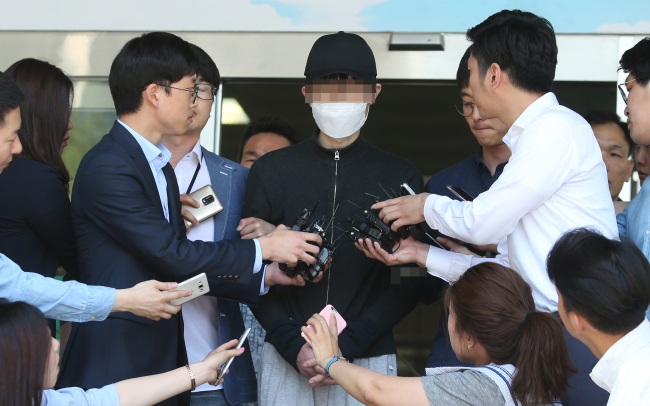The government and lawmakers are stepping up moves to legislate preventive measures and stronger punishment against hate crimes, following the murder of a 23-year-old woman in Gangnam last week.
Although the police reiterated that they view the case as a random crime committed by a mentally-ill person, politicians have come to the fore to identify it as a hate crime, calling for the need to stiffen penalties for crimes motivated by prejudice.
The suspect had testified that he committed the murder out of hatred toward women. The 34-year-old man, only identified by his surname Kim, stabbed the victim -- with whom he had no prior acquaintance -- to death at a public bathroom in the southern district of Seoul on May 17. The case was soon amplified into a social campaign mostly among young Koreans against gender-based violence, with people holding rallies and setting up makeshift tributes for the victim.
 |
The man surnamed Kim caught for stabbing a woman to death in Gangnam on May 17 is taken for an arrest warrant hearing at Seocho Police Station on May 19. (Yonhap) |
Rep. Nam In-soon of the main opposition Minjoo Party of Korea vowed to draft a new legislation that would impose stricter punishment on criminals convicted for crimes against minority sections. “The crime against minorities should be subject to aggravated punishment,” said the feminism activist-turned lawmaker.
Progressive Justice Party leader Rep. Sim Sang-jeung said she would seek “comprehensive and specific” measures against the increasing number of hate crimes during the 20th National Assembly. The four-year parliamentary session is scheduled to kick off on May 30.
Alongside the stricter punishment, safety measures to prevent random crimes in a public space will be pursued. Rep. Shim Jea-chul of the ruling Saenuri Party pledged to implement a regulation to mandate that public bathrooms for men and women should be separated.
“Public bathroom for both sexes are a common place for serious crimes,” said Sim, referring to the fact that the murder took place at a gender-neutral public toilet.
By law, unisex public bathrooms can be constructed inside a building that either has a total floor area of 3,000 square meters or was built before Jan. 29, 2004. If the law clears the Assembly, unisex public bathrooms are required to be renovated into those that separate men and women.
Unlike advanced democracies such as the United States where hate crime laws are applied to the cases targeting gender and racial minorities, South Korea has yet to implement the measure due to objections from religious groups led by big churches.
They claim that the law would create favorable opinion toward homosexuals. Under draft versions of pending bills designed to prevent social discrimination, pastors would also face punishment if they make hate speech against sexual minorities.
The vehement pushback by church leaders has torpedoed attempts to pass the bills banning discrimination based on age, gender and sexual orientation. Since the government introduced the bill for the first time in 2007, the religious groups have protested and prevented it from being signed into law.
For instance, the “antidiscrimination” bills proposed by liberal lawmakers Rep. Kim Jae-yeon in 2012 and Rep. Kim Han-gil in 2013 drew outrage among the big churches and their supporters. Eventually, they gave up their bid to enact the laws.
The same goes for legislative attempts to impose tougher punishment against hate crimes. Minjoo Party Rep. Lee Jong-kul and Saenuri Party lawmaker Rep. Ahn Hyo-dae proposed bills in 2013 to allow harsher punishment for crimes motivated by prejudice, only to be scrapped in the 19th Assembly.
Meanwhile, law enforcement authorities said that they would grant the police authority to immediately hospitalize persons with mental illness who are deemed to pose a danger to the general public. The police officers will be provided with a checklist to objectively evaluate a person’s potential to commit crimes.
“If the police spot mentally-ill individuals who are likely to harm people, they can take them to a psychiatric hospital,” chief commissioner of the Korean Police Kang Shin-myung said in a press conference on Monday.
By Yeo Jun-suk (
jasonyeo@heraldcorp.com)








